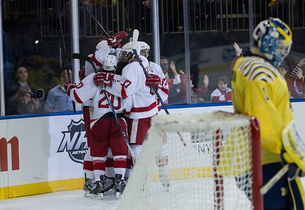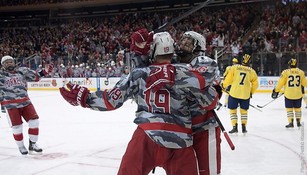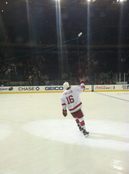I dapple rarely in direct predictions, but I did venture one such prediction in my recap of last weekend. Admittedly, it was not a brazen one but it was no less bold considering that Cornell had scored only three goals in three games at that time. I ventured that once Cornell discovered its latent goal-scoring ability; the floodgates would open. A 5-1 shelling of the "champions of the West" serves as vindication for that prediction. After last weekend's game against Michigan, every senior has tallied at least one point. Ten different members of the 2012-13 Cornell team have scored at least one goal over nine games.
The offensive explosion is what has gotten the most attention. This is with good reason. The game saw Lowry continue his stellar sophomore season with adding a goal and an assist against the Wolverines. Ferlin continued generating great offensive plays and added two assists. He is now the fourth-highest point producer on the team. Senior forward Miller seems poised to continue leading the team in terms of both goals scored, as he did last season, and points produced, as he has for the last two seasons.
Cornell scored more goals in the Frozen Apple than it had in the previous 145:55 of games that it had played immediately before the game at "World's Most Famous Arena."
One could tell the night would be different than the previous three outings very early in the game. Ferlin's encore of his spectacular assist to Mowrey occurred with 4:23 remaining in the first period. The play might not have been as awe-inspiring but it was no less talented and equally important as he passed the puck across ice to Lowry who received the pass and put it behind Racine. The dominance of that power-play play was indicative in the execution and positioning as Miller was poised to knock in any rebounds that might have resulted had Racine made the initial save on Lowry's shot.
The tenor of the game had been struck. The offensive dominance of Cornell was apparent throughout the first period even though only one opportunity was converted. Cornell previously decided that it would exchange its historic and traditional white sweaters for stylized camouflage sweaters in the second period. Programs as rich in and dedicated to history as Cornell is do not deviate from tradition without casting a wary and superstitious eye to such changes. Cornell's choice to change their sweaters later to auction them off to raise funds for the great cause that is The Wounded Warrior Project was karmically rewarded.
It was poetic that a freshman who had played in only one other game before that Saturday evening and who was unburdened by any psychological blocks that might have emerged due to the dearth of offense during the three immediately previous games broke the three-game streak of Cornell scoring only one goal. Miller behind the net found an open Tiitinen positioned on the left side of Racine. Miller connected and Finnish freshman forward Tiitinen sent the puck sailing past Racine.
Miller was not contented with an assist. The skilled Cornell senior forward found the puck in the density of high traffic and Michigan confusion in front of the net. Miller tickled the twine for the first time that evening. It would not be the last time he did so in Manhattan that evening.
As if to prove that somehow the offensive outburst of the second period was not because of the camouflage sweaters, Cornell continued its offensive onslaught through the third frame. Cornell captain Erik Axell joined the scoring barrage nearly eight minutes into the third period. Miller gained a second goal tally of the evening when Ferlin, Lowry, and he joined the rush deep into the Michigan defensive zone when a pass from Ferlin rushing down the point to Lowry on the right side caused Wolverine goaltender Racine to commit to the right side. Lowry flicked the pass to a rushing Miller on the left side who netted easily his second goal of the night.
Punctuated changes get all the attention and acclaim. This is for good reason when a team was suffering what some described as an offensive slump and what I described as an anomaly on a team so offensively talented. However, one should not overlook the consistency of this Big Red team.
Cornell hockey is one epitomized by shut-down defense, special teams, and superb goaltending. Cornell has averaged reducing the number of shots that its opponents take by 10.9 shots per game when compared to each opponent's average shots on goal over the last three games. Cornell has a 100% penalty kill efficiency over the last two weeks. Cornell has maintained its discipline with limiting the number of needless penalties it has taken over the same span. These impressive defensive statistics were earned against teams that rank currently 10th and 12th in the nation in terms of offensive production. Andy Iles has produced a save percentage of 0.963 and a goals against average of 1.00 over the last two games.
The return of the expected offensive output of this team is what has gained deservedly the headlines, but as Schafer has reiterated in interview after interview, Cornell reaped what it had sowed the weekend before the 2012 Frozen Apple. The other narrative headline has been some detraction from the quality of this year's Michigan team. These comments are often attached to an attempt to discredit the worth of Cornell's win at the Frozen Apple.
Commentators and fans of other programs have begun to detract from Cornell's win. Fans of such programs should consider how their programs would fair if it played the Wolverines. Cornell beat the Wolverines in their self-perceived most critical time of the year in the 2012 NCAA Tournament when each Michigan team expects that it can and will compete for a national championship. Then, Cornell went on to defeat Michigan handedly in a game that many billed as a grudge match and a chance for redemption of the Wolverines who greatly wanted to avenge a painful loss to the Big Red.
Michigan is a good team. The traditions of Michigan, much like those of Cornell, demand and expect greatness. That is why this Michigan team has been rumored to fall far short of expectations. However, perspective is needed. Michigan lost in Shawn Hunwick a Hobey Baker Finalist goaltender who was the heart of his team. Most Michigan hockey observers remarked at the close of last season how dependent upon the reliability and skill of Hunwick Michigan had become. This dependence led to small collapses in defensive systems. Hunwick was he who ensured often that such collapses did not punish the Wolverines. It was such a defensive lapse that allowed Cornell to generate the offense to score the game-winning goal against Michigan in the 2012 NCAA Midwest Regional Semifinal.
Rutledge and Racine are freshmen. They cannot be expected to be another Hunwick. Especially not yet. Michigan's defense was sound through most of the game, but the story that has not been told or emphasized is how Cornell pounced upon what mistakes the Wolverines made to convert in spectacular fashion. It was Cornell's skill and opportunism that won the game. The other story is that when Michigan's defense failed, there was not a stellar goaltender to bail the Wolverines out like there had been in previous seasons. Michigan when it made mistakes generated situations in which an overwhelming talented Cornell offense confronted a green goaltender.
Michigan's defense, especially when it was killing penalties, was superb. Cornell made few mistakes on the power-play opportunities that it had. When cycling Cornell players saw an opportunity, they took the shot. The reason that shooting was not as common as some would like is because Michigan did in fact allow Cornell little room to maneuver most time. When it did, Cornell capitalized and converted. This bodes well for both programs.
Michigan will right itself. I observed and noted during the game that Cornell's defense was more of a "bend not break" mentality in which it surrendered occasionally open ice and poor opportunities, but never surrendered a great opportunity to the Wolverines. Michigan's defense however, surrendered almost no opportunities of any variety when it was clicking, but when it was not, Cornell controlled play and moved the puck at will. Consistency was the difference in the two defensive outcomes. Michigan might have been more suffocating when it was clicking but it was dangerously inconsistent. Cornell was stifling, but not suffocating, and was absolutely consistent. Some of these differences are systemic. Cornell executed its system better than Michigan did its own.
Michigan will get sounder. The Wolverines's coaching staff has ample talent with which to work and will find a way to generate the defense that it requires to prop up young goaltending. The biggest problem for Michigan is inconsistent defense and sub-par goaltending. Michigan will find a way to improve one to compensate for the other or both. Murmurs have begun that this will be the year that Michigan misses the NCAA Tournament for the first time in 22 years. I contest that it was not. This is a Michigan team that is very talented. It may require that the Wolverines win the Mason Cup in the last season of the CCHA as it has had to do before, but this Michigan team will find a way to win, will make Cornell's win against them very valuable, and will not miss the 2013 NCAA Tournament.
Cornell was calm when it surrendered opportunities and ensured that Michigan did not convert. Defenders, especially D'Agostino and Ryan, were critical in transition. The few times that wearers of the winged helmet were about to break out into the Cornell zone, D'Agostino and Ryan showed great poise in regaining position or pushing opportunities to the outside walls while fellow teammates dropped back. Cornell's defenders were never beaten on speed against one of the faster teams in the nation.
MacDonald and Gotovets were spectacular behind the blue line when Michigan managed to hem Cornell into the Big Red's own zone. The second period saw this early as a resurgent and re-energized Wolverine team emerged from the tunnel to attempt to tie the game and regain control of a game that appeared even in the first period to not be going its way. Gotovets and MacDonald kept Cornell in control of the game by not allowing the maize and blue to tie the score and seize momentum.
Andy Iles was as spectacular as ever. He has shown that the large scale and high stakes games at The Garden do not affect adversely his play. He delivered a great performance that included well disciplined orthodox saves and others like a save that can be called only a fist-pump save early in the first period to push the puck in mid-air along the back corner.
The spectacular aspect of this game was that it was a team victory and a team effort. Players seemed as excited for their own goals and key plays as they did for those of their teammates. I think that Miller was more excited about his assist to Tiitinen's first career goal than he was about his two goals and the excitement of Ferlin in helping his team with two assists was apparent in his conducting of the pep band as the third period wound down. I enjoyed the parody of Kevin Lynch's frustrated conducting of the Cornell Pep Band during the 2012 NCAA Midwest Regional Semifinal. The team has continued to stand up for itself against undisciplined conduct of other teams. The image of Cornell's highest NHL drafted player, Brian Ferlin, staring down Michigan's highest NHL drafted player, Jacob Trouba, after a morally suspect hit on senior forward Esposito is etched forever in my memory.
Cornell's defense has been back for three games now. Most think that Cornell's offense is back to stay after five goals against Michigan. The surest way to make sure that the college hockey world knows that this team's explosive offense is back is to show the visitors from the North Country in the last two clashes of the first half of the season.






 RSS Feed
RSS Feed
